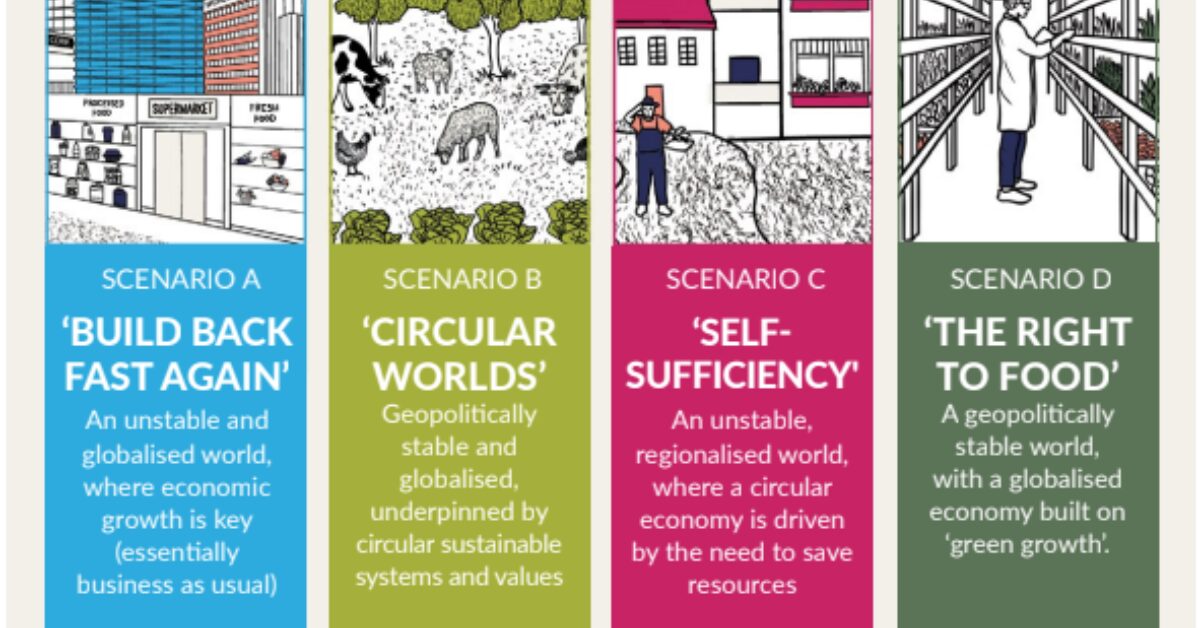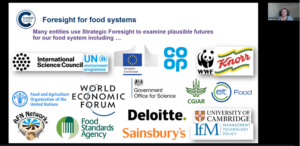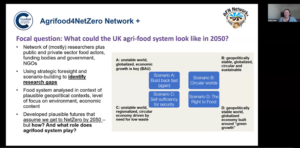Using strategic foresight techniques to think about our future food system
30/01/2024

Close your eyes for a moment and imagine you’re sitting down for dinner in the year 2050. What’s on your plate? Maybe alternative protein is the centrepiece of your meal, whether that’s crickets sprinkled on your soup, or lab-grown meat in your burger. Is your meal specifically formulated to provide exactly the nutrition you need, a flavoured, powder-based goo that quickly gets you back to the rest of your evening knowing you’ve consumed something to keep you healthy and cut your food waste to zero? Perhaps your meal is mostly plant-based, with vegetables farmed regeneratively, and locally grown beans.
Whatever you imagined, chances are your 2050 dinner may be different to the one you had yesterday. Our food system accounts for around a quarter of UK greenhouse gas emissions, and however our diets look in the future, the food system will need to decarbonise in line with the UK’s ‘net zero by 20250’ commitment. As yet, there is no plan for how this will happen, and no consensus on how we can meet the multiple challenges of adapting to climate change, reversing biodiversity loss and decarbonising our food system while ensuring food security and sustainability.
In this context, using strategic foresight techniques to think about our future food system can help us consider the alternative futures for food, and the trade-offs and advantages that may exist in each scenario in uncertain geopolitical, environmental or social contexts. Strategic foresight supports sustainability and innovation resilience through systematic analysis of trends or disruptions and the development of alternative plausible futures that stress-test options and consider different pathways to innovate sustainably. The strategic foresight process seeks to bring together diverse perspectives with expertise in issues related to a central theme or question, and often involves the selection of key drivers of change in a system. For instance, key drivers impacting our food system could include demand shifts, globalisation, geopolitical stability, climate change or health. What then follows, is an examination of how those drivers might interact to produce different outcomes in a system. Strategic foresight is valuable in informing policy planning for government, private sector and academia in the context of uncertainty, since decisions made today, if based only on existing evidence taken from historical trends, may not be fit for purpose in the future.
I wanted to examine the future of our food system with MSc Sustainability professionals as part of their Strategic Foresight module, and I am always keen to take advantage of any opportunities to bring real-world impact into teaching and learning. Having inputted in a recent scenario-building process with the AgriFood4NetZero Network + (AFN+), I felt it would be interesting for professionals studying the MSc Sustainability to look at a ‘live’ example of strategic foresight processes, and one in which they could input and influence as experts in their respective fields. The MSc Sustainability course is designed to develop sustainability-literate change agents who can set and deliver organisational strategy over the long-term, bringing together professionals from a wide range of industries to build their knowledge and competencies for sustainability leadership.
The AFN+ had put together plausible scenarios for our food system in 2050, but they had not yet been finalised and published. With permission to share the draft scenarios, I provided MSc Sustainability professionals with the chance to review and provide feedback and sent this back to the AFN+. This process added critical input from a diverse group of industry professionals as the scenarios and final report were brought together.
The AFN Network+ is a unique network of 1,000+ academics, researchers, third sector organisations, policy makers, and agri-food industry professionals from farmers to retailers. Together, it’s working to identify key research gaps that may be holding the UK food system back from transitioning towards a net zero UK by 2050, while also enhancing biodiversity and healthy ecosystems, nurturing livelihoods, supporting healthy consumer habits, and minimising the environmental impacts of overseas trade. Its findings will inform the next decade of research investments in this area by UKRI. Alongside core research, it runs in-person and online events, produces topical resources, and gives out hundreds of thousands of pounds of funding a year. AFN Network+ is coordinated by the University of East Anglia, University of the West of England, University of York, and University of Leeds, and is a £5m, 3-year project funded by four research councils: the Biotechnology and Biological Sciences Research Council, Economic and Social Research Council, Engineering and Physical Sciences Research Council, and the Natural Environment Research Council.

Teaching on the MSc Sustainability Strategic Foresight module was my first experience of teaching at Cranfield University, and my first teaching post-graduate students. I was an MSc student myself at Cranfield just a couple of years ago, so it goes without saying that I felt woefully underqualified to be on the other side of the (virtual) desk. But as an experienced educator, I’m familiar with guiding and facilitating exploration, reflection and creativity, and took this approach to get MSc Sustainability professionals working together to apply their theoretical understanding of Strategic Foresight to a new topic. Huge thanks go to the sustainability professionals for their enthusiastic response, and to my tutor Dr Kenisha Garnett for believing in me!
To learn more about the Sustainability Business Specialist Apprenticeship (with Sustainability MSc) at Cranfield University, click here.
Categories & Tags:
Leave a comment on this post:
You might also like…
Introducing… Bloomberg Trade Flows
Are you interested in world trade flows? Would it be useful to know which nations are your country's major trading partners? If so, the Bloomberg terminal has a rather nifty function where you can view ...
Cranfield alumni voyage to the International Space Station
Seeing our alumni reach the International Space Station (ISS) has a ripple effect that extends far beyond the space sector. For school students questioning whether science is “for them”, for undergraduates weighing their next ...
From classroom to cockpit: What’s next after Cranfield
The Air Transport Management MSc isn’t just about learning theory — it’s about preparing for a career in the aviation industry. Adit shares his dream job, insights from classmates, and advice for prospective students. ...
Setting up a shared group folder in a reference manager
Many of our students are now busy working on their group projects. One easy way to share references amongst a group is to set up group folders in a reference manager like Mendeley or Zotero. ...
Company codes – CUSIP, SEDOL, ISIN…. What do they mean and how can you use them in our Library resources?
As you use our many finance resources, you will probably notice unique company identifiers which may be codes or symbols. It is worth spending some time getting to know what these are and which resources ...
Supporting careers in defence through specialist education
As a materials engineer by background, I have always been drawn to fields where technical expertise directly shapes real‑world outcomes. Few sectors exemplify this better than defence. Engineering careers in defence sit at the ...








Comments are closed.